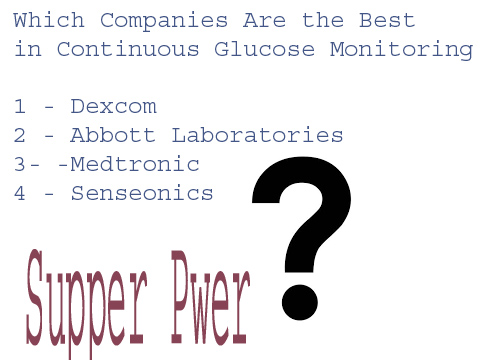Continuous Glucose Monitoring (CGM) technology has revolutionized diabetes management, offering real-time insights into glucose levels for people with diabetes. This tech helps users manage their blood sugar levels more efficiently by providing constant data and reducing the need for finger-prick tests. As the demand for CGM devices grows, several companies are leading the way in this rapidly advancing field. Let’s explore the top companies that are at the forefront of CGM technology.
1. Dexcom
One of the pioneers in CGM technology, Dexcom is renowned for its cutting-edge continuous glucose monitoring systems. The company's flagship product, the Dexcom G6, offers real-time glucose monitoring without the need for fingersticks. Dexcom's devices are known for their accuracy, ease of use, and user-friendly mobile apps, allowing users to track their glucose levels on smartphones or smartwatches. Key Features of Dexcom CGM Systems:- No calibration required (no fingersticks needed).
- 10-day sensor lifespan.
- Compatibility with smartphones and smartwatches.
- Customizable alerts for high and low glucose levels.
2. Abbott Laboratories (FreeStyle Libre)
Abbott is another leading player in the CGM market, particularly with its popular FreeStyle Libre systems. The FreeStyle Libre 2 and FreeStyle Libre 3 offer glucose monitoring with minimal invasiveness and an affordable price point compared to other options on the market. The Libre system provides a sensor that is worn on the arm and requires a scan using a handheld reader or a smartphone app to view glucose levels. Key Features of FreeStyle Libre Systems:- Affordable compared to other CGM systems.
- 14-day sensor lifespan (longer than most competitors).
- Scannable sensor for quick glucose readings.
- Real-time alarms for high and low glucose levels (Libre 2 and Libre 3).
3. Medtronic
Medtronic is a well-established player in diabetes care, offering a comprehensive range of CGM systems. The company’s Guardian™ Connect CGM system is particularly notable for its accuracy and ability to predict glucose highs and lows in advance, offering users valuable time to adjust their insulin or food intake. Medtronic also integrates CGM technology into its insulin pumps, allowing users to benefit from a complete diabetes management system. Key Features of Medtronic CGM Systems:- Predictive alerts (up to 60 minutes in advance).
- Integration with insulin pumps.
- Customizable alarms for glucose fluctuations.
- Smartphone app for monitoring glucose levels.
4. Senseonics (Eversense)
Senseonics offers the Eversense CGM, which is unique in that it features an implantable glucose sensor. The Eversense E3 system includes a long-lasting sensor that can be worn for up to 6 months, providing a longer lifespan compared to traditional CGM sensors. Eversense systems are known for their implantable technology and innovative approach to continuous glucose monitoring. Key Features of Eversense CGM Systems:- Long sensor life (up to 180 days).
- Implantable sensor, reducing frequent sensor changes.
- Real-time glucose monitoring via smartphone.
- On-body vibrating alerts for high and low glucose levels.
5. GlucoMe
GlucoMe is an up-and-coming player in the CGM market, offering a complete digital diabetes care platform. GlucoMe integrates CGM data with cloud-based analytics, offering a holistic approach to diabetes management. The system provides real-time glucose monitoring, data sharing with healthcare providers, and personalized insights to improve diabetes care. Key Features of GlucoMe CGM System:- Cloud-based analytics for comprehensive diabetes management.
- Real-time glucose monitoring.
- Data sharing with healthcare professionals.
- Personalized insights and recommendations.
The Importance of CGM Technology
Continuous glucose monitoring technology has transformed the way individuals manage diabetes by providing a real-time view of glucose fluctuations. Traditional blood glucose monitoring methods often only capture glucose levels at a specific moment, while CGM provides a continuous stream of data, allowing for proactive decision-making regarding diet, exercise, and insulin usage. CGM systems are particularly useful for individuals with Type 1 and Type 2 diabetes, helping them maintain optimal glucose control and reduce the risk of long-term complications. Advantages of CGM Technology:- Provides real-time glucose data.
- Reduces the need for frequent finger-prick testing.
- Offers predictive alerts for glucose highs and lows.
- Improves overall diabetes management and outcomes.
Factors to Consider When Choosing a CGM System
When selecting a CGM system, it’s important to consider several factors:- Accuracy: Look for systems that provide reliable and precise glucose readings.
- Cost: Evaluate the overall cost, including sensor replacements and subscription services.
- Ease of Use: Choose a system with an intuitive interface and seamless integration with other devices.
- Sensor Lifespan: Longer sensor lifespans reduce the need for frequent replacements.
- Alerts and Alarms: Consider whether the system provides real-time alerts for glucose fluctuations.
